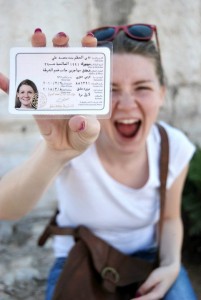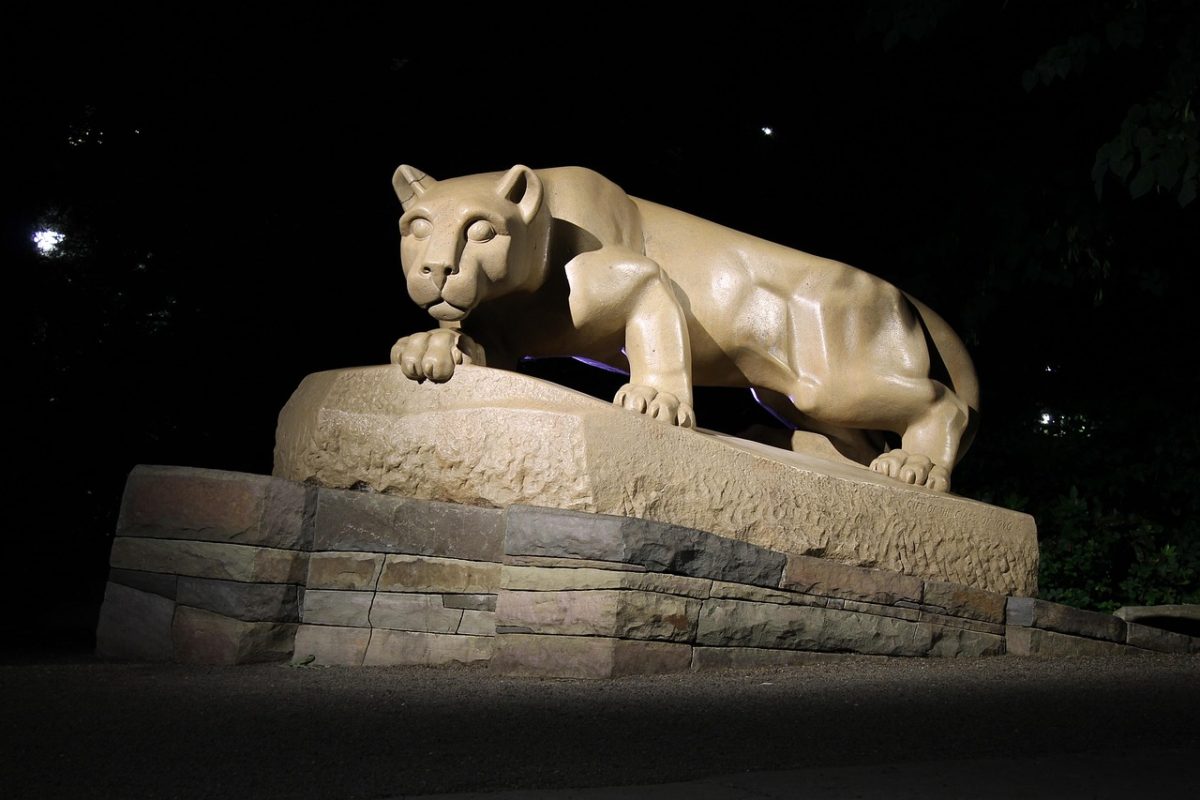By: Hannah Gundermann
All United States’ immigrants face challenges. Few migrate alone. Even fewer are eighteen years old. Not many come from the Middle East. Let alone the fact that they are leaving their family in the midst of the Syrian Civil War.
Walking through campus, she felt an overwhelming amount of loneliness, fear, and disbelief begin to sink in.

The green grass, the plethora of trees, and the cleanliness of the scenery was so unfamiliar compared to her dry, desert-like home environment. Even the buildings look different. Nothing was comfortable, familiar.
No one could relate to being from Syria. No one was living in question of the safety of their family. No one knew the questions that were running through her head.
The inability to connect to friends and family was a reality that is a foreign concept to most college students. War brings restriction, even when it comes to internet connection and phone lines.
Moving home isn’t an option after college for her. “I don’t have the option of a plan ‘B’ like most students, my plan ‘A’ has to work.”
Not only does she have to stay away from her home, her home will never look the same when she returns. Destruction is constant and out of her control.
The destruction has affected her even though she is overseas. For example, if she wants to visit her mother, she can’t even fly into an airport in her home country.
Also, notifications flooding her phone aren’t ‘retweets’ on Twitter or ‘likes’ on Instagram. The notifications are from news sources updating her on the war back home. Every alert could be the difference between her family’s life and death.
Along with sharing of news, comes misleading news. She never knows if the news is accurately depicting the events occurring.
“I will see something about bombing in Syria and immediately call my mom. Most of the time, she doesn’t even know about the news I hear.”

Her mother deals with situations like this every day, and she almost accepts it as being normal.
This is the life of Nada Azem, a 23-year-old, currently residing in New York City. This situation seems typical for someone her age, but her life is anything besides typical. Azem was born in New York City to Syrian parents. At age three, her and her mother moved back to Damascus, Syria after her parents divorced. She then returned to the United States for college right as the Syrian Civil War began in 2011.
Azem’s story begins in Damascus at age three. For her, Syria was always a very safe place growing up. By the time she was in fourth grade, she was able to walk places alone or with her friends.
Azem spent a great deal of time with her friends because her mom worked a lot. Her mother owned and still owns a school, and she is the principal there.
Fun with her friends for her was much different than for American children. In Syria, there are no malls or movie theaters for entertainment. Instead, Azem and her friends would go to coffee shops and restaurants for something to do.
Another difference from America was when Azem lived there, they had very few American products that we are used to seeing and using on a daily basis.
“Growing up we didn’t even have Coca-cola or Pepsi products until I was in eighth grade,” said Azem. When they finally got these products, it was considered cool if you would came to school with a bottle of Coke.
Nada Azem did not have the typical schooling of Syrian children. Her mother was very insistent that Azem learn English. Because of this, she went to a school that taught all subjects in both English and Arabic from second through eighth grade.

The education system in Syria is much different than in America.
“In all schools you took Religion studies,” said Azem. The only two options for Religious studies were Islamic and Christian. This is very unrealistic for American schools because students practice more than two religions or don’t practice a religion at all.
In ninth grade, Azem went to an American school in Syria run by the American Embassy. According to The Embassy of the United States, the embassy in Syria is located in Damascus.
At this school, all of her classes were in English only. Typical Syrians learn Arabic, then French, and finally English.
Since Azem’s mother was very insistent on her learning English, Azem was able to take all of her classes in English by this time. Learning English at a young age also helped Azem when she came to the United States.
Azem first came to the United States as a child to visit at age 12. She came to visit her father who was living in Atlanta, Georgia. This gave her an outlook on what America was like.

There was only one time when Azem recalls the country being in a war-like situation when she lived there.
It was during seventh grade. America bombed the border of Syria. Everyone thought that America was going to declare war.
“Things were so chaotic. Even my school was evacuated,” said Azeem. At this school Azeem was one of few native Syrians because there were a lot of foreign students. No one knew what was the reality and what were just rumors.
The incident was minor compared to the war in Syria today.
Azem permanently came here when she was 18 years old to start her college education. She attended Elon University in Elon, North Carolina.
Not everyone from Syria could attend college, much less an American college but Azem did well in high school. In addition, she and her family valued education very much.
“Coming to America for college was always an option for me after I finished high school,” said Azem. Her dad came to the United States after high school, so it was a set concept and theme that she followed.
In her home country, the people think of America as the place to go if you want to live your dream and succeed.
Azem also really likes the education system and the style of teaching in the U.S.
Coming to America wasn’t all glamour and glitz though. Azem experienced a huge change that would take anyone time to get accustomed to.

“The environment was the strangest difference for me to get used to,” said Azem. North Carolina is very green with lots of trees and grass. In Syria, she was accustomed to the dry, desert-like surroundings.
Even the buildings were noticeably different for Azem. Back home, the buildings were all made of rock and marble. When she came to Elon, the buildings all seemed much less sturdy.
Elon was also very clean compared to her home.
“At Elon, I could walk barefoot without worrying, but in Syria you should never walk barefoot,” said Azem.
The culture in North Carolina was also a very shocking transition of Azem. One of the most surprising elements was that everyone she was meeting only spoke one language fluently. In Syria, most people she knew spoke at least two, if not more, languages fluently.
Culture embodies a lot of aspects. Not only does it include language, but also food.
“People put cheese on everything here,” said Azem. At home they ate cheese, but not the amount we do. It was shocking that Americans put cheese on so many foods.
The initial transition was difficult for Azem. She gradually began to understand the American culture and environment throughout her time at Elon.

During her time at college, she visited home over winter break for two weeks every year. Since she couldn’t fly into Syria directly, she flew into Lebanon, Syria’s neighboring country. Then she drove about 80 miles from Beirut, Lebanon across the border into Damascus, Syria.
The first time she visited home since the civil war began in 2011 was a very strange experience for her. Everywhere she looked there were guards and tanks.
“I came home and all of a sudden everyone carries a gun on the street,” said Azem.
In May of 2014, Azem graduated from Elon University with a Bachelor’s degree in Art.
Her passion for art is another reason she wanted to come to the U.S. According to Azem, art as a career is not very well accepted in Syria. She felt as though it would benefit her success in this field if she was in America.
After graduating in 2014, she headed home to visit for four months. This was the longest period of time that she spent there since the start of the war.
Once she returned to the U.S., she moved to a studio apartment in Manhattan, New York City. Originally, Azem had wanted to attend a New York City college, but thought that it may be too overwhelming at the start. Since she felt this way, she decided to come for graduate school.
She came to the city in order to attend New York University.

When she first came to New York, the diversity became extremely prevalent. According to Elon.edu, eighty one percent of their first year students are white. Azem also added that most of the students were Christian.
“Even the way people dressed at Elon; the girls all wore dresses and boots,” said Azem. Now in NY every person is unique.
Even the way individuals walk, talk, and act are all so different.
At Elon, she could say one word to someone and people would immediately pay attention to her accent and notice that she is foreign. In NY, everyone has an accent and people don’t even think twice when speaking to her.
“New York almost feels like a different country from Elon sometimes,” said Azem.
In 2015, she earned a Masters of Fine Art in Art Politics from New York University.
Now she is still living and working in the city.
Azem is continuing to stay here as of now for a multitude of reasons. She feels that the system here will allow her to succeed more than it would in Syria. Also, she can freely express herself here which is not always accepted at home. In addition, she has the ability to live on her own as a young women.
Out of the factors keeping her here, war is on the top of the list.
Currently in Syria, it is very hard for people to live and work. It is also very difficult to go in and out of the country. She finds that America is a more suitable for her to take care of herself.
Right now her mother is still living in Damascus, and her dad is living in Saudi Arabia.
The migration out of Syria has been higher since the war. According to European University Institute Migration Policy Centre, 1,387,806 Syrians have fled the war to neighbouring countries.

Azem’s mother does not plan on leaving the country like the others because she is very patriotic.
“My mother’s philosophy is that since she was born there, she’ll die there,” said Azem. Her mother’s home, work, and life is there.
Her mother does understand why a lot of people are moving, and she does not look down on them because of it.
A lot of people are fleeing because they are frightened for their young children. Another reason is because their business is not doing well.
“My mother’s school is still open and running well,” said Azem.
Also, her mother doesn’t have to worry about her only child living in the U.S.
Despite her mother’s schools success, it was not all smooth sailing.
Before the war, her mother had 1,500 students attending her school. This number dipped all the way down to 500 students, but now is on the rise at around 800 students.
The daily life of her mother has been altered drastically to the point that her mother can’t even drive to work anymore. Her mother now has to ride a bus to and from work because there were so many check points with guards when she drove independently.
Azem hopes that life will return to normal soon for her mother.
“Compromise is going to be the biggest factor in order to resolve the war I think,” said Azem. She believes that the people in power need to take a step back and open up to new ideas.
Other countries have also been affected by this war through migration. Azem believes that if a country can help, they should at least try.
“This war is no longer a Syrian issue, but a world issue,” said Azem, “It’s a temporary situation, if more countries contribute, the more temporary it will be.”






